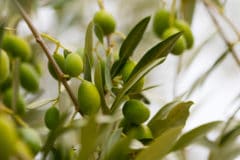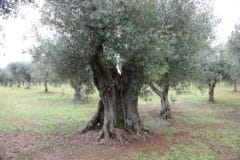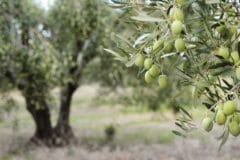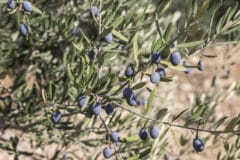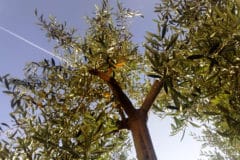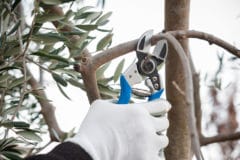The Oldest Olive Tree
The oldest known living olive tree is the Olive Tree of Vouves in Crete. This tree is estimated to be between 2,000 and 3,000 years old – and it still produces tasty olives!
Harvested for Thousands of Years
Olives are native to the Mediterranean, and archeological evidence tells us they have been actively cultivated for as long as 6,000 years. This makes the olive tree one of the oldest crops grown by people.
Green Olive Trees or Black Olive Trees?
There is no such thing as a green or black olive variety. All olives start out green end up black or purple.
Olives Can be Grown Indoors
Olive trees love the sunshine, but smaller varieties also do well as a potted plant or even a bonsai.
The Wood of Olive Trees is Useful
Olive wood is extremely hard and is used for carvings and cutting boards. Olive wood burns hotter than many other wood, and it produces little smoke.
The Olive is a Symbol of Peace
Since Biblical days, the olive branch has been a symbol of peace. For this reason, an olive branch is displayed on many flags, including the United Nations flag and national flags of Cyprus and Eritrea.
Olives are Widely Cultivated
While olives only do well in areas with hot, dry summers and mild winters, where they do grow, they are grown in abundance. There are over 800 million olive trees planted around the world, producing 2.8 million tons of olive oil each year.
The Mission Olive is from California
The popular Mission olive variety was developed by Spanish missionaries in California in the 1700’s.
Olive Oil Lighted the Ancient World
Ancient people in Rome and Greece did not have fossil fuels for lighting their homes. Instead, they used olive oil, burning it in lamps. They also used the oil in cooking, and cured olives were an important part of their diet.
Olives are Good for You
Not everyone likes eating olives, but if you do, they provide plenty of nutrients, being high in:
- Vitamin E
- Antioxidants
- Iron (in black olives)
- Copper
- Calcium
- Healthy unsaturated fats
Olives Used for Medicine
Fresh olives are inedible due to the bitter chemical oleuropein, but this compound has medicinal value and is helpful for reducing high blood pressure and treating diabetes and heart disease.

